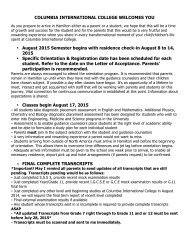french
You also want an ePaper? Increase the reach of your titles
YUMPU automatically turns print PDFs into web optimized ePapers that Google loves.
Lesson 3.04 - Money<br />
G: Personal Pronouns Review<br />
Main article: w:French personal pronouns<br />
Direct Objects<br />
While the subject of a sentence initiates an action (the verb), the direct object is the one that is affected by<br />
the action. A direct object pronoun is used to refer to the direct object of a previous sentence:<br />
Pierre voit le cambrioleur. Pierre sees the burglar.<br />
Pierre le voit.<br />
Pierre sees him.<br />
The following table shows the various types of direct object pronouns:<br />
French me, m' te, t' le, l' la, l' nous vous les<br />
English me 1 you 1 him, it her, it us 1 you 1 them<br />
Notes:<br />
1 me, te, nous, and vous are also used as indirect objects to mean to me, to you, to us, and to you<br />
respectively.<br />
The pronoun form with an apostrophe is used before a vowel.<br />
The direct object pronoun for nous and vous is the same as the subject.<br />
When the direct object comes before a verb in a perfect tense, a tense that uses a past participle, the<br />
direct object must agree in gender and plurality with the past participle. For example, in te phrase Je<br />
les ai eus, or I had them, the past participle would be spelled eus if the direct object, les, was referring<br />
to a masculine object, and eues if les is referring to a feminine object.<br />
Indirect Objects<br />
An indirect object is an object that would be asked for with To whom...? or From whom...?. It is called<br />
indirect because it occurs usually together with a direct object which is affected directly by the action:<br />
Il donne du pain à Pierre. The man gives some bread to Pierre.<br />
Il lui donne du pain.<br />
He gives bread to him.<br />
The following table shows the various types of direct object pronouns:<br />
French me, m' te, t' lui nous vous leur<br />
English to me 1 to you 1 to him, to her to us 1 to you 1 to them<br />
Notes:<br />
1 me, te, nous, and vous are also used as direct objects to mean me, you, us, and you respectively.<br />
The pronoun form with an apostrophe is used before a vowel.<br />
The indirect object pronoun for nous and vous is the same as the subject.




